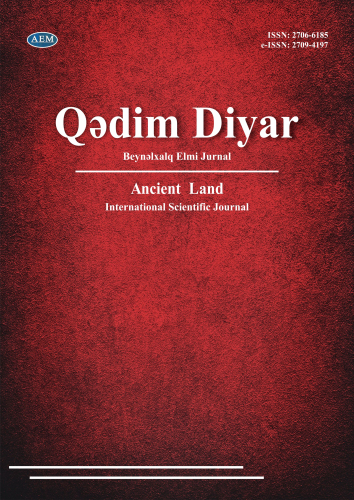https://doi.org/10.36719/2706-6185/40/64-67
Cavanşir Əmirov
Bakı Biznes Universiteti
magistrant
emirov.cavansir00@gmail.com
“Norm” ASC-də vergi əməliyyatlarının uçotu və auditinin
təkmilləşdirilməsi istiqamətləri
Xülasə
Audit ‒ əmtəə istehsalı və satışı, xidmət göstərilməsi və iş görülməsi ilə məşğul olan təsərrüfat subyektlərində mühasibat uçotunun dəqiq və dürüst aparılmasının, mühasibat və maliyyə hesabatlarının müstəqil yoxlanılmasıdır. Audit aktivlərin, öhdəliklərin, xüsusi vəsaitlərin və maliyyə nəticələrinin düzgün, bütöv və dəqiq əks etdirilməsini müəyyənləşdirmək məqsədilə qüvvədə olan qanunvericiliyə uyğun surətdə iqtisadi subyektlərin tərtib etdikləri illik maliyyə hesabatlarının müstəqil yoxlanmasını nəzərdə tutur. Auditin əsasını dövlətin, müəssisənin müdriyyətinin və onun sahiblərinin (əmanətçilərin, səhmdarların) qarşılıqlı marağı təşkil edir. Bir sıra ölkələrdə audit dedikdə, müəssisələrin yoxlanılması və onun maliyyə hesabatı haqqında fikir söylənilməsi başa düşülür. Britaniya Audit Praktikasi Komitəsinin 1989-cu ildə verdiyi tərifə görə, Böyük Britaniyada audit “qüvvədə olan qanunvericiliklə müəyyənləşdirilmiş bütün qaydalara riayət olunmaqla, müəssisənin mühasibat hesabatı barədə peşəkar fikir ifadə etmək məqsədilə həmin hesabatın xüsusi təyin edilmiş auditor tərəfindən müstəqil öyrənilməsi deməkdir”. Qanuna əsasən, ABŞ-də səhmləri qiymətli kağızlar birjasında qiymətləndirilməyə buraxılan bütün səhmdar cəmiyyətlərinin maliyyə fəaliyyəti auditdən keçməlidir. Qərbdə (ABŞ) auditə verilən ən məqbul təriflərdən biri aşağıdakı kimidir: Audit (auditing) elə bir prosesdir ki, onun vasitəsilə səlahiyyətli sərbəst işçi kəmiyyətcə qiymətləndirilə bilən və spesfik təsərrüfat sisteminə aid olan informasiyanın müəyyən edilmiş meyarlara uyğunluq dərəcəsini müəyyənləşdirmək və bunu öz rəyində ifadə etmək üçün həmin informasiya haqqındə sübutlar toplayır və onları qiymətləndirir. Amerika Mühasibat İşi Assosiasiyasının auditin əsas prinsipləri üzrə komitəsi auditə aşağıdakı tərifi vermişdir. Müxtəlif şirkətlərin tez-tez müflisləşməsi, müdiriyyət tərəfindən aldadılma halları maliyyə qoyuluşları riskini xeyli artırır.
Açar sözlər: vergi uçotu, audit, “Norm” ASC, təkmilləşdirmə, maliyyə hesabatları
Javanshir Amirov
Baku Business University
Master student
emirov.cavansir00@gmail.com
Directions for Improving Accounting and Auditing of Tax
Transactions in “Norm” OJSC
Abstract
Improving the accounting and auditing of tax transactions helps to increase the financial control and efficiency of companies. Improving technical infrastructure and hiring quality personnel helps companies achieve transparency and accuracy in financial reporting processes. Therefore, financial and managerial expertise play an important role in ensuring the long-term success of companies. Through these measures, companies can manage their financial positions more effectively, increase their speed and better protect their activities from financial risks. This is finally an important necessity to meet the long-term development and speed of the companies. Improving the accounting and auditing of tax transactions in “Norm” OJSC increases the financial transparency of the enterprise and ensures compliance with legislative requirements. Application of modern
technologies, continuous training of staff, strengthening of internal control systems and the role of independent audit increase the effectiveness of these processes. These measures not only ensure the accuracy of financial data, but also increase the efficiency of operations and allow timely detection of potential risks. The application of modern ERP systems and cloud technologies ensures the automation of tax operations and real-time monitoring of data. These technologies enable the secure storage of data and the facilitation of data exchange between departments located in different geographical locations. As a result, accounting processes are carried out faster and more accurately. Continuous training and professional development of the staff helps to update their knowledge and skills and work according to international standards. Continuous training programs and certification programs ensure the professional development of employees and increase their competitiveness at the global level. This ensures that tax operations are performed correctly and in accordance with legislative requirements. Strengthening of internal control systems requires the application of systematic control mechanisms and the use of digital control tools at every stage of tax operations. These measures increase the accuracy and transparency of operations, and ensure timely detection of potential errors and problems.
Keywords: tax accounting, audit, “Norm” OJSC, improvement, financial statements

